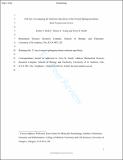Substrate specificity of the neutral sphingomyelinase from Trypanosoma brucei
Abstract
The kinetoplastid parasite Trypanosoma brucei causes African trypanosomiasis in both humans and animals. Infections place a significant health and economic burden on developing nations in sub-Saharan Africa, but few effective anti-parasitic treatments are currently available. Hence, there is an urgent need to identify new leads for drug development. The T. brucei neutral sphingomyelinase (TbnSMase) was previously established as essential to parasite survival, consequently being identified as a potential drug target. This enzyme may catalyse the single route to sphingolipid catabolism outside the T. brucei lysosome. To obtain new insight into parasite sphingolipid catabolism, the substrate specificity of TbnSMase was investigated using electrospray ionization tandem mass spectrometry (ESI-MS/MS). Recombinant TbnSMase was shown to degrade sphingomyelin, inositol-phosphoceramide and ethanolamine-phosphoceramide sphingolipid substrates, consistent with the sphingolipid complement of the parasites. TbnSMase also catabolized ceramide-1-phosphate, but was inactive towards sphingosine-1-phosphate. The broad-range specificity of this enzyme towards sphingolipid species is a unique feature of TbnSMase. Additionally, ESI-MS/MS analysis revealed previously uncharacterized activity towards lyso-phosphatidylcholine despite the enzyme's inability to degrade phosphatidylcholine. Collectively, these data underline the enzyme's importance in choline homoeostasis and the turnover of sphingolipids in T. brucei.
Citation
Dickie , E A , Young , S A & Smith , T K 2019 , ' Substrate specificity of the neutral sphingomyelinase from Trypanosoma brucei ' , Parasitology , vol. 146 , no. 5 , pp. 604-616 . https://doi.org/10.1017/S0031182018001853
Publication
Parasitology
Status
Peer reviewed
ISSN
0031-1820Type
Journal article
Description
This work was supported primarily through the European Community’s Seventh Framework Programme under grant agreements no. 602773 (Project KINDRED), with additional support from Wellcome Trust Project grant (086658); Medical Research Council (MR/M020118/1) and the School of Chemistry (The University of St Andrews).Collections
Items in the St Andrews Research Repository are protected by copyright, with all rights reserved, unless otherwise indicated.

